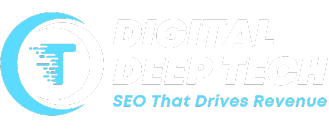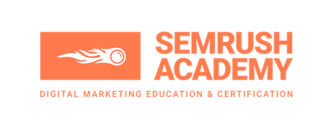The Ultimate Guide to Programmatic SEO Tools
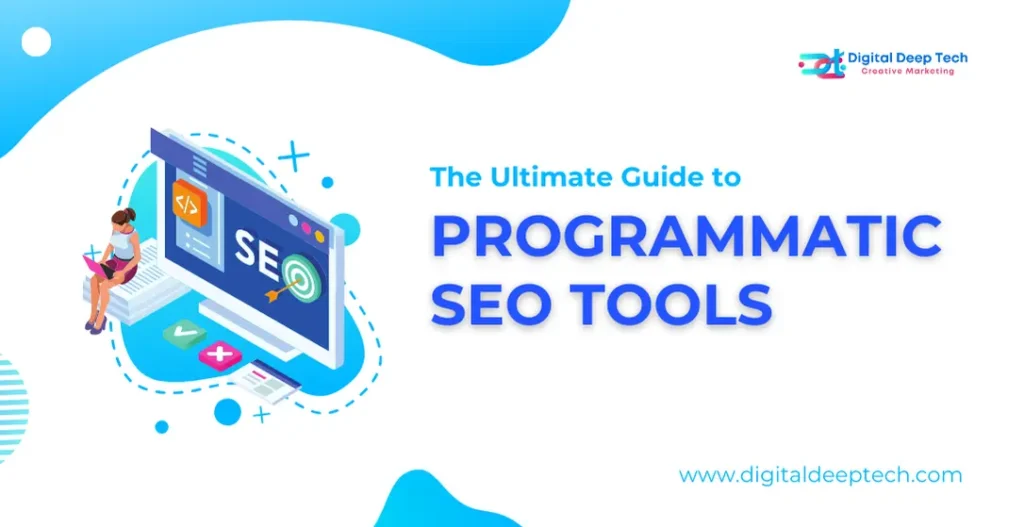
Table of the content
Digital marketing itself undergoes a lot of evolution, and with that, strategies are to be followed in SEO. One such development in this area is programmatic SEO—a sophisticated approach using automation and AI to scale efficiently. In this guide, we’re going to delve a little deeper into the intricacies of programmatic SEO tools: how they work, their benefits, and how to implement them effectively.
What is programmatic SEO?
Understanding Programmatic SEO
Programmatic SEO, in itself, differs greatly from the other traditional methods. Where the latter has its core work based on the optimization of individual web pages, the former makes the optimization of several pages automatic. The approach relies on the capability to leverage large datasets and algorithms that drive improvements in SEO at scale.
2. Definition of programmatic SEO and overview
Programmatic SEO, at its very core, means the creation of a huge number of optimized pages due to automation. Structured data, algorithms, and advanced tools aid businesses in covering a far greater number of keywords and search queries compared to regular techniques. This works very well with large sites having extensive product catalogs or a great volume of content, where manual optimization would be unrealistic.
3. Traditional vs. Programmatic SEO: Key Differences
Traditional SEO typically deals with optimizing single pages, and it consumes much time and is labor-intensive. Programmatic SEO automates this process, allowing bulk optimizations or updates. Here’s a differentiation comparison:
Traditional SEO relies on manual keyword research, on-page optimization, and content generation. On the other side, programmatic SEO automated the generation of keywords through templates for content and creation on a large scale.
Let's Discuss Your Project
Get a free one-month consultation and share your vision for digital marketing with us.
How Does Programmatic SEO Work?
Mechanisms and Key Concepts: Programmatic SEO relies on several concepts:
- Automation: This involves creating and optimizing web pages with the help of tools.
- Data-driven insights: Utilize large data sets to create strategies regarding SEO and content.
- AI Integrations: AI-driven tools that enhance keyword research, content generation, and tracking of performances.
Examples of Programmatic SEO in Action
Several real-world applications bring out the power of programmatic SEO, such as:
- E-Commerce Sites: Automation for product pages according to structured data and inventory updates.
- Local Businesses: Generation of geotargeted location pages ranked for local search queries.
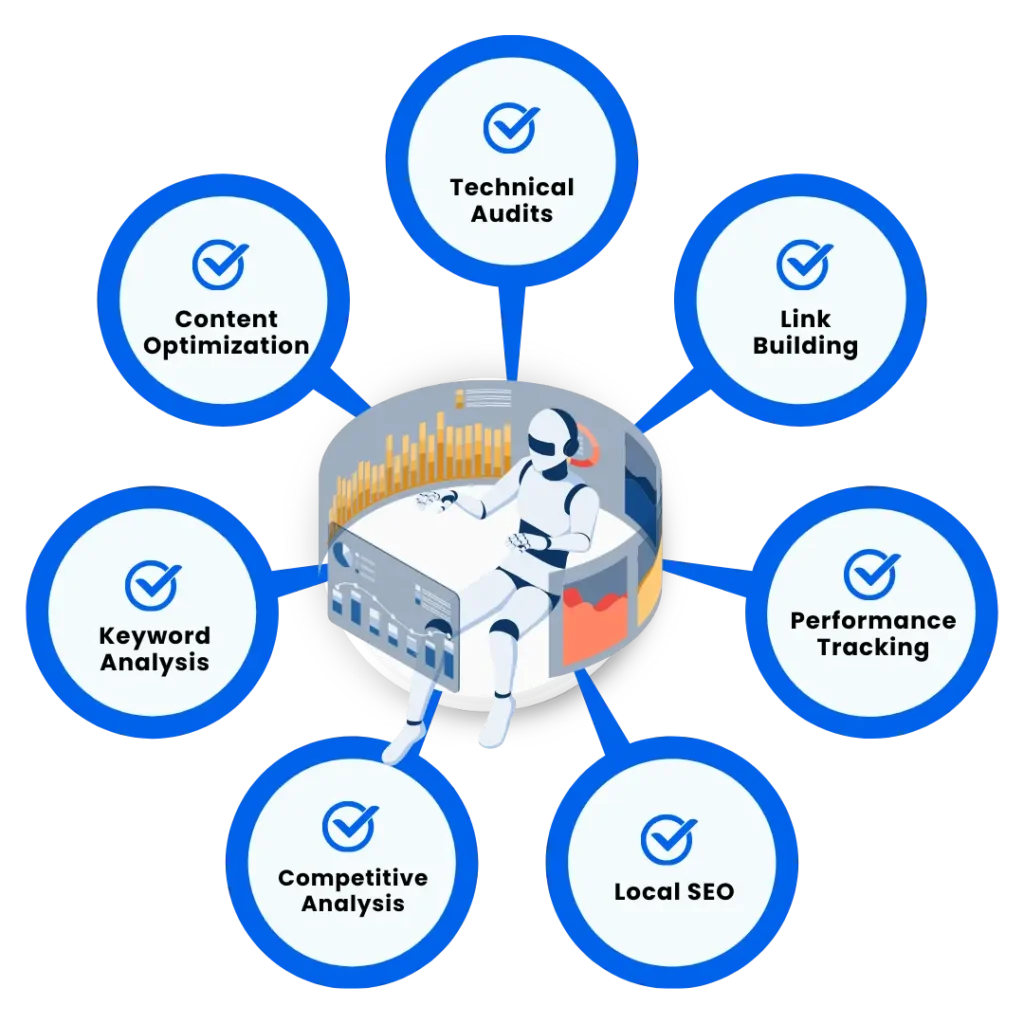
Best Programmatic SEO Tools for Your Strategy
AI-Powered SEO Tools
AI-powered tools are essential to the work when implementing your programmatic SEO strategy. Advanced features of the tool include automated keyword research, content generation, and performance analysis. Some of the top AI-powered SEO tools include:
- Ahrefs: It is known for its in-depth keyword research and backlink analysis features.
- Jasper: AI writing assistant for high-quality SEO-optimized content
- Rytr: AI content generation tool with keyword-rich text for all purposes.
Benefits of AI in Programmatic SEO
AI enhances SEO efforts through the automation of repetitive tasks, data-driven insights, and high-quality content. This would ultimately result in more speed and effectiveness in strategy implementation.
Rapid Examples: Ahrefs, Jasper, Rytr
- Ahrefs: handles keyword research, website audits, and backlink analysis with huge force.
- Jasper: assists in generating engaging and SEO-friendly content.
- Rytr: AI-powered content creation on target keywords and topics.
Scalable SEO Tools for Growing Sites
Growing websites and manually handling their SEO becomes hard. Scalable SEO tools do this by automating a portion of the SEO process. Examples include:
- Screaming Frog: It is a website crawler that assists in detecting problems and opportunities associated with SEO.
- SEMrush: This one offers complete SEO analytics by bringing keyword tracking and competitor analysis features into play.
- SEOmatic: It is a tool designed to make SEO tasks automated, especially for management and reporting.
How to Scale Your SEO Efforts
Scaling your SEO will require you to make use of tools and methods devised for supporting large numbers of content and keywords. This comprises the use of automated content generation, bulk optimization of keywords, and the incorporation of SEO data from numerous sources.
Content Automation Tools
These tools allow for the easier creation and management of SEO content. They are critically important to scale in terms of consistent quality and content optimization. Examples include:
- GPT-3 AI Writer Enabled: The latest in artificial intelligence in the creation of search engine ranking-optimizing content.
- Frase: Researching, Optimizing, and Creation
- Content Paraphrasers: Tools that rephrase existing content to avoid duplication and gain more SEO
Why content generation through automation is a requirement?
Only automated content generation allows for high-quality content rich in keywords without manual work. Not only will this procedure save time, but it will also make such content friendly to search engines.
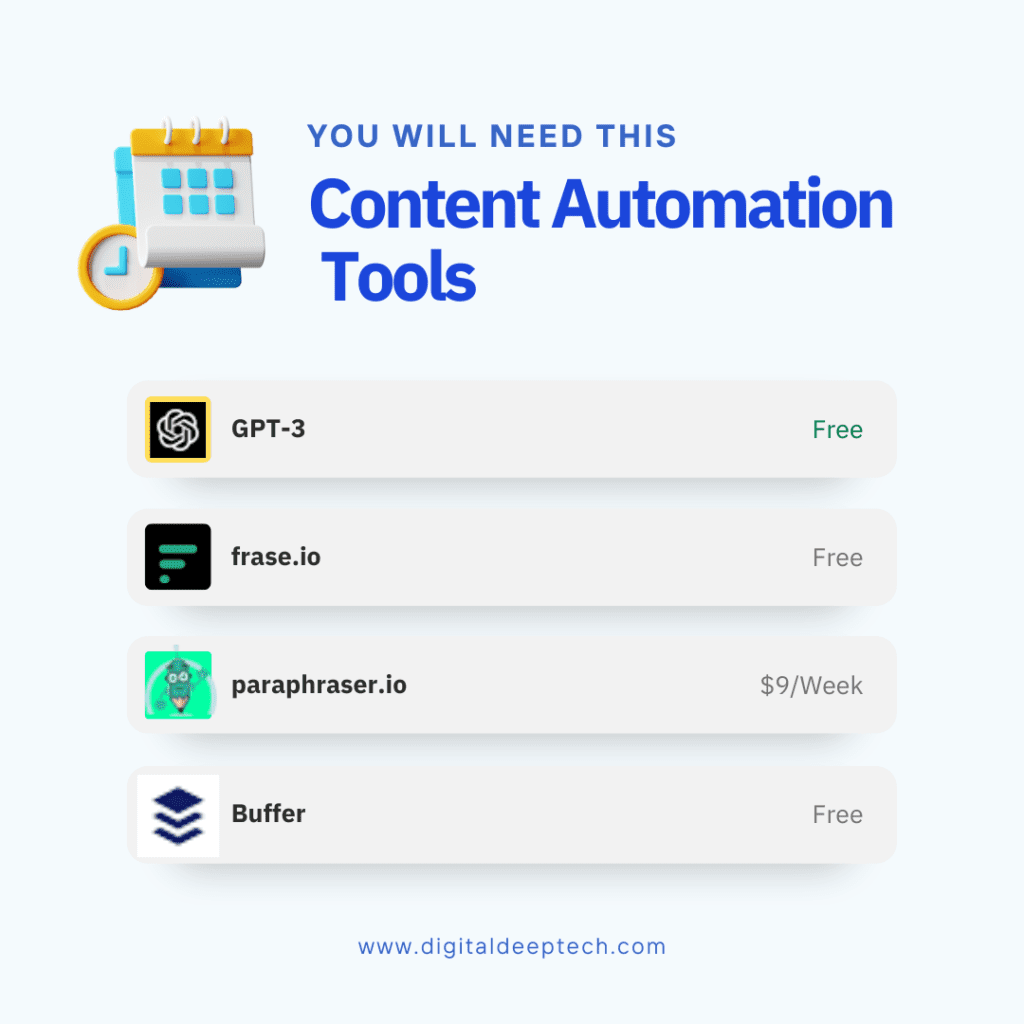
SEO Tool Integrations and Software
Combining different SEO tools into one can enrich your overall strategy with different functionalities and data sources. Some of the useful integrations would be:
- Google Sheets—for tracking and analyzing SEO metrics;
- Airtable—for content and SEO workflow management.
- Zapier: Automating workflows and interlinking different SEO tools.
Practical Programmatic SEO Techniques
How to create content automatically?
Programmatic content generation is the process of generating SEO-optimized content with the aid of automatic tools and techniques. Methods include the following:
- Content Templates: These are predefined templates that generate content on certain keywords and topics.
- Dynamic Variables: Adding variables in the Content Templates for the creation of unique pages. Variables change the content in compliance with user input or data sources and create unique, relevant pages.
Programmatic SEO for WordPress
Tools and plugins for WordPress: There are several tools and plugins that WordPress users can use to implement programmatic SEO. Some of these are as follows:
- WP All Import: This is a plugin that is used for importing and managing large content volumes.
- PageFactory: This tool is used to create and optimize SEO pages. • Programmatic SEO
- WordPress: it contains plugins that are specially built over programmatic SEO implementations.
Case Studies in Programmatic SEO
It has been proven through case studies that programmatic SEO is effective in real-world scenarios, such as:
- E-commerce Success: An e-commerce company generated thousands of optimized product pages through programmatic SEO that greatly increased traffic. Describes precisely how programmatic SEO helped an online retailer improve their visibility and drive sales.
- Local SEO: Geo-targeted location pages improved local SEO search ranking for the brand of a local business. This indicates that geo-targeted pages are mandatory to help improve one’s local search rankings.
Programmatic SEO Advanced Strategies
Using AI for Programmatic SEO
AI is one key programmatic element in SEO since it automates tasks, analyzes large data, and makes action-oriented recommendations toward the optimization of content, thus following up on the improvement of one’s SEO strategies.
Examples:
- Bardeen AI: It is an AI-powered tool that automates repetitive SEO tasks and assists in data-driven insights.
- Placid.app: Dynamic image and content generation for SEO-optimized images.
Unique SEO Pages and Geo-Targeted Location Pages
Programmatic SEO allows one to get to a granular level with unique and geo-targeted pages fitting specific audiences. This includes:
- Geo-Targeted Location Pages: Pages targeting local search queries and geographic locations. Pages that increase local search visibility to target specific geographic areas.
- SEO Templates: Customizable templates are used for the generation of optimized pages based on keyword and location data. That are templates for creating optimized content about subjects and keywords across a vast range of topics.
How Automation Can Work in SEO Content Creation
Automation of SEO content creation means using tools and techniques that make a process easier while maintaining its quality. Best practices include:
- AI Content Generators: Tools generating high-quality and SEO-friendly content automatically.
- Content Auto-Generation Tools: Tools generating content according to predefined templates and keywords. These are tools such as GPT-3 and Jasper that automate content creation.
Programmatic SEO Implementation Tools
Web Scraping and Data Extraction Tools
Data is at the core of programmatic SEO. It gives insights and dictates strategies. Web scraping and data extraction tools help collect useful information to be optimized.
- Tailgraph: Advanced web scraping and data extraction.
- Data Scraping Tools: Automate the process involved in data collection and analysis.
SEO Data and Analytics Tools
These will be the kinds of tools that are very instrumental in monitoring and evaluating the work of SEO. With these, one can track performance and trends in performance and make data-driven decisions.
- Google Analytics: Enhanced data about the traffic on a website, user behavior, and SEO performance.
- Plausible: privacy-friendly analytics to track the performance of one’s website.
- Matomo: open-source analytics for in-depth analysis in SEO and web metrics.
Indexing and SEO Checker Tools
Indexing and SEO checker tools are used to ensure that pages are correctly indexed and comply with SEO best practices. These tools discover problems and make a page search engine-friendly.
- IndexMeNow: Monitor and manage the indexing of pages.
- SEO Checker: Get information on how your page is performing in SEO and where improvements are required.
- HeyMeta: It is a meta tag analyzer that helps optimize the metadata of a page.
How to Automate SEO Content with AI
These AI tools make the process of keyword research and optimization much easier by discovering high-value keywords and optimizing one’s content accordingly. Examples include:
- Ubersuggest: A keyword ideas tool that also analyzes competition.
- Ahrefs: It contains broad functionality for keyword research and optimization.
- Keyword Chef: helpful in discovering long-tail keywords and optimizing content.
Implementing AI for the creation of SEO pages
Automating the creation of SEO pages involves how one efficiently goes about generating optimized pages using artificial intelligence tools and techniques. Steps include:
- Page Generator Pro for creating SEO-friendly pages using templates and data.
- SEOBrrr for generating pages in an automated manner by optimizing the content on them.
Beating the Challenges of AI-Powered SEO
While AI-powered SEO has various benefits, it also comes with the challenges of automation errors and possible penalties. These common problems include:
- Automation Errors: These are mistakes that happen during the automation of content generation that need manual intervention. Mistakes while generating content or implementing SEO that need to be corrected.
- Google Penalties: These are the risks because of overly aggressive automation and keyword stuffing. PENALTIES upon breaking guidelines on SEO or using black-hat techniques.
Programmatic SEO Ideas and Best Practices
Practical Tips to Effectively Do Programmatic SEO
For effective programmatic SEO, the following are some tips that need to be kept in mind:
- Develop a Clear Strategy: Goals and objectives for programmatic SEO should be defined. A document on the general understanding and implementation of programmatic SEO.
- Use automation wisely. This step involves automating processes with tools without loss of quality. Tips and Strategies on Effective Ways of Using Programmatic SEO Tools and Techniques.
How to Learn Programmatic SEO
Programmatic SEO can be mastered by utilizing the resources available and the training programs provided. Examples include:
Programmatic SEO Course Online: The courses and tutorials to be taken online to learn programmatic SEO.
Programmatic SEO Tutorials: Steps to Follow Guides and Videos to Do Programmatic SEO. Tutorials to Learn and Master Techniques in Programmatic SEO
FAQs
What are the best programmatic SEO tools?
Some of the best programmatic SEO tools include Ahrefs, Jasper, Rytr, Screaming Frog, and SEMrush. Each of them offers end-to-end features in keyword research, content generation, and SEO management.
How Do AI-Powered Tools Help to Improve Your SEO?
AI-powered tools improve SEO through task automation, data-driven insight provision, and content optimization. They help with fast and fruitful research of keywords, create content quickly, and allow one to track performance effectively.
What are some practical examples of programmatic SEO?
Examples of this include the autogeneration of product pages for e-commerce sites and location pages geotargeted for local businesses.
How do I implement programmatic SEO on WordPress?
Tools and plugins like WP All Import, PageFactory, and Programmatic SEO WordPress can help you automate your SEO processes and manage a large quantity of content in an organized manner.
What Challenges Might I Face with Programmatic SEO?
Challenges include managing automation errors, avoiding Google penalties, and ensuring content quality and relevance.

About the Author
Deepak Sharma is the founder of Digital Deep Tech and a renowned SEO and digital marketing expert with over a decade of experience. Passionate about helping businesses enhance their online presence, Deepak specializes in creating SEO strategies that drive traffic and generate leads.

